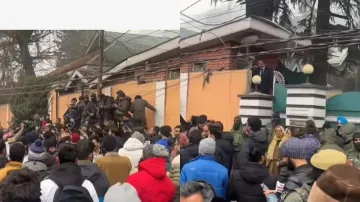Protests against the newly implemented reservation policy in Jammu and Kashmir have intensified, with hundreds of students and political leaders gathering outside Chief Minister Omar Abdullah's residence on Sunday to demand a review of the policy. This policy, introduced earlier this year under the leadership of Lieutenant Governor Manoj Sinha, has sparked widespread controversy across the region.
The demonstration saw participation from prominent political figures, including National Conference (NC) Member of Parliament, Ruhullah Mehdi, who voiced his support for the protest. Mehdi had earlier urged students on social media to participate in the protest, calling for a rational approach to the reservation policy. Other political leaders like PDP's Waheed Para, Iltija Mufti, and Awami Ittihad Party leader Shiekh Khurshid (brother of Engineer Rashid) also joined the protest. Omar Abdullah’s son was seen standing alongside Mehdi and the students during the protest.
What is reservation policy?
Introduced at the beginning of the year ahead of the Jammu and Kashmir Assembly elections, the new reservation policy reduced the reservation percentage for the general category in jobs and educational admissions while increasing the percentage for reserved categories. Additionally, the policy grants 8% reservation to the Other Backward Classes (OBCs) and adds 15 new castes to the OBC list, based on the recommendations of the Social and Educationally Backward Classes (SEBC) Commission. The policy also includes reservations for specific communities like ethnic tribes, the Paddari caste, and others, which were approved by Parliament.
Opposition to policy
The reservation policy has led to significant backlash from both political leaders and students, with demands for its review and reversal coming from various quarters in the region. Ruhullah Mehdi had promised to stand with students in their fight against the policy, criticizing the current government's failure to take action. He pointed out the unclear division of authority between the elected government and the office of the Lieutenant Governor, which has led to inaction on the issue. Mehdi assured that the government would soon take steps to address the concerns raised.
Government's response
In response to the mounting protests, the Jammu and Kashmir government formed a three-member committee on December 10 to review the reservation policy. The committee, consisting of Health Minister Sakina Ittoo, Forest Minister Javed Ahmad Raina, and Science and Technology Minister Satish Sharma, was tasked with reviewing the policy, though no specific deadline for submission of the report was set. Meanwhile, the Jammu and Kashmir High Court also intervened, directing the government to respond to petitions challenging the policy within three weeks.
CM Omar Abdullah’s statement
Chief Minister Omar Abdullah addressed the protests on Sunday, acknowledging the concerns surrounding the reservation policy. He stated that his government had formed a committee to review the policy and would follow any final legal decisions made by the court. Abdullah emphasized that the policy was under judicial scrutiny and expressed his commitment to reviewing the policy in line with the party's stance.
The Chief Minister also welcomed peaceful protests as a democratic right, assuring that the concerns regarding the policy would not be ignored and that all parties would be heard before a fair decision was made.
This issue remains a contentious one in Jammu and Kashmir, with many calling for a transparent and equitable review of the reservation policy, which has become a central topic of political debate in the region.
